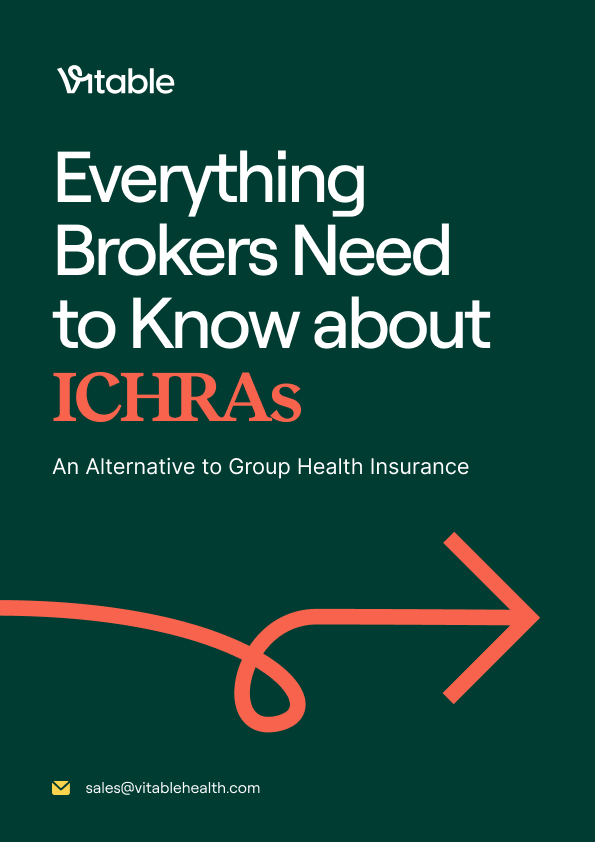What is an HRA Administrator

Discover the role of an HRA Administrator: simplify, optimize, and streamline your Health Reimbursement Arrangement with Vitable.
As a business owner, navigating the nuances and jargon around health benefits can feel overwhelming and unnecessarily complicated. But don't worry—we’re here to simplify it.
If you're looking for a way to offer affordable, flexible healthcare benefits to your workforce, you may want to explore Health Reimbursement Arrangement plans (HRA plans). These allow employers to reimburse employees for healthcare expenses in a tax-advantaged way. But managing these plans—especially Individual Coverage HRAs (ICHRAs) or Qualified Small Employer HRAs (QSEHRAs)—requires expertise, strategy, and compliance. That’s where an HRA administrator comes in.
An HRA administrator is responsible for overseeing and managing the day-to-day operations of your HRA plan. From setup and compliance to employee education and claims processing, they play a critical role in making sure everything runs smoothly.
Below, we’ll break down the HRA administrator's role, responsibilities, and why working with a trusted partner like Vitable can help you stay ACA-compliant while offering better benefits to your employees.
What Does an HRA Administrator Do: Role & Responsibilities
A Health Reimbursement Arrangement (HRA) administrator is a professional, either internal or third-party, tasked with managing all administrative functions of an HRA plan. Whether you're offering an Individual Coverage HRA or a Qualified Small Employer Health Reimbursement Arrangement, proper HRA administration is essential for compliance, efficiency, and employee satisfaction.
Plan Design and Setup
One of the first responsibilities of an HRA administrator is to help you determine the type of HRA plan that fits your organization best, such as an ICHRA or a QSEHRA plan. They’ll walk you through eligibility requirements, reimbursement limits, qualified expenses, and other key considerations to ensure your HRA program aligns with business goals.
Employee Communication and Support
Clear communication is critical. An HRA administrator provides your employees with all the information they need about their plan, including how to enroll, how to file claims, what expenses are covered, and how reimbursements work. They also answer employee questions and provide support throughout the HRA enrollment process, ensuring employees are well-informed and can make the most of their HRA accounts.
Documentation and Record-Keeping
Accurate documentation and record-keeping are essential for maintaining compliance and ensuring seamless administration of HRA plans. The HRA administrator tracks and maintains all HRA plan documentation, records of employee eligibility, reimbursement requests, and expense receipts. This ensures smooth audits, maintains transparency, and helps businesses meet IRS and HIPAA requirements.
Compliance and Regulatory Oversight
HRA Plans are governed by various IRS and ACA regulations. A qualified HRA administrator keeps your HRA plan compliant by staying up-to-date with regulatory changes and applying them to your plan to avoid errors or costly penalties. This is particularly important for businesses using ICHRA health insurance or offering a QSEHRA to a small team.
Claims Processing and Reimbursement
One of the key responsibilities of an HRA administrator is reviewing and processing reimbursement requests submitted by employees. They verify the eligibility of expenses, ensuring they align with the HRA plan guidelines. The HRA administrator coordinates with the appropriate parties to facilitate timely and accurate reimbursements, making the reimbursement process smooth and hassle-free for employees.
Reporting and Analysis
To help you evaluate the performance of your HRA plan, the HRA administrator generates and compiles reports detailing plan usage, reimbursement trends, and cost data. These insights can help you make more informed decisions about future HRA plan design and budget allocation.
Vendor Management
In some cases, HRAs may be outsourced to third-party administrators or insurance providers. In such instances, the HRA Administrator oversees the relationship, ensuring effective communication, adherence to service level agreements, and addressing any issues that may arise. This ensures a seamless experience for the business while working with external partners.
Ready to get started? Get a free quote today!
Why Use an HRA Administrator for Your ICHRA or QSEHRA?
Whether you're setting up a Qualified Small Employer HRA or managing an ongoing Individual Coverage HRA, partnering with an HRA administrator brings numerous benefits:
Expertise in Compliance
HRA Administrators have specialized knowledge and expertise in managing HRAs. They are well-versed in IRS regulations, ACA requirements, and HRA-specific guidelines. HRA administrators help you avoid penalties and ensure your HRA plan remains compliant as rules evolve.
Administrative Efficiency
Managing an HRA plan in-house can be time-consuming and complex. Outsourcing to a dedicated HRA administrator allows your team to focus on running your business while experts handle plan logistics.
Better Employee Experience
When employees have questions, need help with claims, or want to better understand their benefits, an HRA administrator is there to support them. This leads to higher engagement and satisfaction with your healthcare offerings.
Real-Time Reporting and Cost Control
HRA administrators provide businesses with data-driven reports that show how your plan is being used. This helps identify trends, manage costs, and optimize your healthcare budget moving forward.
Vendor Management
If the HRA plan involves working with third-party administrators or insurance providers, an HRA administrator can handle the relationship and coordinate with vendors on behalf of the business. This includes ensuring compliance with service-level agreements, addressing issues, and streamlining communication, freeing up the business's resources.
Scalable, Flexible Solutions
As your team grows or your needs change, your HRA administrator can adjust your plan accordingly. Whether it's scaling contributions, adding coverage categories, or switching from a QSEHRA to an ICHRA, they make transitions easy.

Download 2025 Employer Guide to ICHRA
Vitable’s ICHRA Guide gives employers a clear, step-by-step resource for building smarter, ACA-compliant benefits.
This guide explains how ICHRAs work, who qualifies, and how Vitable simplifies setup, onboarding, reimbursements, and compliance — while giving employees more flexibility, control, and care.

Download Vitable’s 2025 Broker’s Guide to ICHRA
The Broker Guide to ICHRAs is a comprehensive resource that helps brokers understand, sell, and manage Individual Coverage HRAs with confidence.
This guide covers everything from compliance and class design to administration flows, case studies, and how Vitable streamlines quoting, enrollments, and reimbursements for brokers, employers, and employees.
How to Set Up an HRA Plan with the Help of an Administrator
If you’re considering offering a Qualified Small Employer HRA (QSEHRA) or Individual Coverage HRA (ICHRA), working with an experienced HRA administrator can help ensure a smooth setup process and long-term success. Here’s what you can expect:
1. Select the Right HRA Type
The first step is determining which HRA plan makes the most sense for your business. Some small businesses opt for a QSEHRA plan, also known as a Qualified Small Employer HRA. Larger or more complex teams may benefit from an Individual Coverage HRA. An HRA administrator will guide you through the differences and help you make an informed decision.
2. Customize Your HRA Benefits
Once the plan type is selected, your HRA administrator will help tailor the HRA plan details, such as monthly allowance amounts, eligible reimbursement categories, and employee eligibility rules, to match your goals and budget.
3. Establish a Start Date
You'll select a start date for your HRA plan, which sets the timeline for employee enrollment and reimbursement eligibility.
4. Coordinate Policy Changes
Depending on the HRA type, you may need to make adjustments to existing group health insurance policies. Your HRA administrator will advise on what changes, if any, are required for compliance with IRS guidelines.
5. Prepare Legal Plan Documents
Every HRA must have legally compliant plan documents. Your HRA administrator will draft and deliver these for your business, ensuring they meet IRS, ERISA, and other regulatory standards.
6. Support Employee Enrollment in Individual Health Insurance
Depending on the HRA plan type, the HRA administrator may conduct one-on-one meetings with employees. For example, with ICHRA plans, employees need to be enrolled in qualifying individual health insurance coverage. Your HRA administrator can help employees explore their options and enroll in the right plan, improving the likelihood of plan adoption and satisfaction.
7. Launch the Reimbursement Process
Once your HRA plan is active, the HRA administrator will manage claims submissions and reimbursements through the HRA administrator's digital platform, helping employees get the most out of their benefits while ensuring your business stays compliant.
Ready to get started? Get a free quote today!
Why Choose Vitable for HRA Administration?
At Vitable, we offer more than just HRA administration—we provide a complete healthcare solution that’s affordable, scalable, and built for the real needs of working Americans.
When you partner with Vitable, you don’t just get help setting up an HRA. Every HRA plan we administer includes access to our enhanced Primary Care membership, which features in-home and virtual primary care visits, over 1,000 free prescriptions and labs, and a robust mental health program.
We help employers provide high-quality care while keeping healthcare costs under control. Our team will guide you through every step of the process—from selecting between an ICHRA or QSEHRA plan to supporting your employees with enrollment and claims. With Vitable, you can rest assured your team is covered, your business is compliant, and your benefits are better.
Frequently Asked Questions
What qualifications are required to become an HRA Administrator?
There are no formal qualifications or certifications required by regulatory authorities for HRA administrators. However, having a strong understanding of healthcare benefits, IRS regulations, and HRA administration best practices is essential. Many HRA administrators have backgrounds in HR, benefits consulting, or health insurance.
What are the responsibilities of an HRA Administrator?
An HRA administrator is responsible for designing the HRA plan, ensuring regulatory compliance, managing employee communications, processing reimbursement claims, maintaining documentation, and providing reporting and analysis.
How does an HRA Administrator benefit my business?
By outsourcing HRA administration, you gain access to healthcare and compliance expertise, reduce your administrative burden, and provide a better employee experience—without the risk of falling out of compliance.
What is the difference between an ICHRA and a QSEHRA?
A QSEHRA, or Qualified Small Employer Health Reimbursement Arrangement, is designed for businesses with fewer than 50 full-time employees and allows for tax-free reimbursement of individual health insurance premiums and qualified medical expenses. An ICHRA, or Individual Coverage Health Reimbursement Arrangement, works for businesses of any size and offers more customization and flexibility.
What should businesses consider regarding compliance when using an HRA Administrator?
Businesses should ensure that the HRA administrator has appropriate measures in place to ensure your HRA plan stays in compliance and protects the privacy and security of employee health information under HIPAA. They should also ensure compliance with IRS regulations, ERISA requirements (if applicable), discrimination rules, state and local laws, and maintain accurate benefit plan documents while regularly monitoring compliance to address any changes or adjustments needed.
How does Vitable support HRA Administration?
Vitable handles the full scope of HRA administration—from compliance and plan design to employee support and reporting. We also offer an enhanced Primary Care membership with every plan, delivering true value to both employers and employees.
Book a Free Consultation with Vitable
Not sure which HRA plan is right for your team? Wondering how to get started? We’ve got you.
During your free consultation, we’ll review your current healthcare spending, evaluate your options, and run a cost-benefit analysis to help you identify opportunities for savings and better outcomes. After the call, we’ll design a custom plan tailored to your workforce, including suggested HRA plans, policy documents, and a full benefits budget.
We make HRA administration easy, so you can focus on what matters most: running your business and supporting your team. Let’s Get Started!
Ready to learn more?
Stay ahead with the latest insights on healthcare, benefits, and compliance—straight to your inbox.
Get a quote
Get a personalized health benefits quote tailored to your company’s unique needs.
Vitable helps employers provide better healthcare to their employees and dependents by improving accessibility, cost, and quality.
